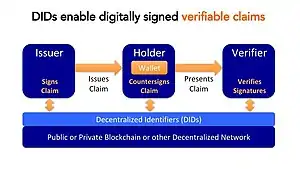Self-sovereign identity
Self-sovereign identity (SSI) is a concept in the digital movement that only the user should own their identity data fully without intervention from outside administration.[2] With SSI, the individual identity holders can fully create and control their verifiable credentials, without being forced to request permission of an intermediary or centralized authority and gives control over how their personal data is shared and used. The individual has a means of generating and controlling unique identifiers as well as some facility to store identity data.[3]


The basic structure of a SSI is as following: The claim-issuer issues identity to the user. User has control over the identity. User presents part of the identity to the relying party so that it could identify the user. For this system to work, the replying party needs to trust the identity issued by the claim-issuer.[4]
A SSI can be a decentralized identity, but could also be data from a social media account, a history of transactions on an e-commerce site, or attestation from friends or colleagues.
In the centralized identity paradigm a person’s identity is provided by some outside entity. In the decentralized identity paradigm the user is at the centre of the framework and there is no need for third parties to issue and administer an identity.[5]
European Union SSI
The European Union is creating an eIDAS compatible European Self-Sovereign Identity Framework (ESSIF). The ESSIF makes use of decentralized identifiers (DIDs) and the European Blockchain Services Infrastructure (EBSI).[6][7]
References
- "Decentralized Identifiers (DIDs)". World Wide Web Consortium. Retrieved 15 July 2020.
- Ferdous, Md Sadek; Chowdhury, Farida; Alassafi, Madini O. (2019). "In Search of Self-Sovereign Identity Leveraging Blockchain Technology". IEEE Access. 7: 103059–103079. doi:10.1109/ACCESS.2019.2931173. ISSN 2169-3536.
- "Blockchain and digital identity" (PDF). eublockchainforum.eu. 2 May 2019. Retrieved 16 June 2020.
- Mühle, Alexander; Grüner, Andreas; Gayvoronskaya, Tatiana; Meinel, Christoph (2018). "A survey on essential components of a self-sovereign identity". Computer Science Review. 30(1): 80–86.
- "eIDAS supported self-sovereign identity" (PDF). European Commission. May 2019. Retrieved 16 June 2020.
- "Understanding the European Self-Sovereign Identity Framework (ESSIF)". ssimeetup.org. 7 July 2019. Retrieved 22 June 2020.
- "European Blockchain Services Infrastructure (EBSI)". European Commission. Retrieved 1 July 2020.